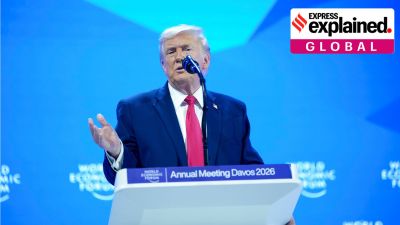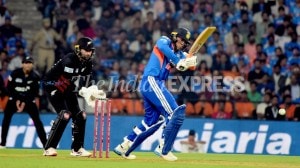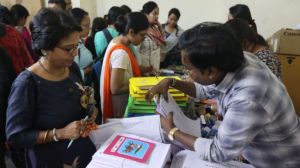Negotiating the Persian maze
There has been a naive expectation among professional seminarists that New Delhi would somehow be stampeded into lining up with Washington o...

There has been a naive expectation among professional seminarists that New Delhi would somehow be stampeded into lining up with Washington on the Iranian nuclear issue when the IAEA Board in Vienna takes up the matter on September 19. News trickling out of the Manmohan Singh-Bush meeting does not bear that out. In fact, the soundbites have been more about BJP reservations on the Indo-US nuclear deal which served as a kind of rejoinder to President Bush pointing to the debate on the issue in the US Congress.
On Iran, the Indian position, spelt out to Washington as well, has been that it would be premature to give up on diplomacy. External Affairs Minister Natwar Singh has been by the prime minister8217;s side in New York. His are the latest assessments of the new Iranian leadership. Natwar Singh held lengthy meetings in Tehran last week with President Mahmoud Ahmedinijad, Foreign Minister Manoochehr Mottaki, and the country8217;s chief nuclear negotiator, Ali Larijani. In the Bush-Manmohan Singh exchange on Iran, India has been in possession of the latest first-hand impressions.
Larijani says that the IAEA8217;s latest report on Iran8217;s atomic programme did contain some 8220;negative8221; points but Iran would continue to co-operate with the agency. He told a TV network: 8220;Because of Iran8217;s close co-operation with the agency 8212; many of the questions have been answered from a legal and technical point of view8230;There are some minor questions remaining and our co-operation with IAEA will continue in order to answer these questions.8221;
The IAEA report does claim that all is not known of Iran8217;s links with a clandestine network that Pakistani nuclear scientist A.Q. Khan controlled. Other areas where IAEA8217;s probe continues are Iran8217;s experiments with plutonium which can also be used to fuel bombs. Iran has not yet handed over all the documents related to the offer that the A.Q. Khan network made Iran in 1987 8212; during the Iran-Iraq war. There are several technical questions related to the work going on at Isfahan, Lavizan, and so on.
The international community has to decide whether it engages with the new Iranian leadership or push it into a corner. President Ahmedinejad has come to power on a populist platform. One factor which boosted his vote was the impression that Rafsanjani was some sort of a West-inclined moderate. Christiane Amanpour8217;s series on CNN building up Rafsanjani, in fact recoiled on him. 8220;Iran is no Georgia or Ukraine where 8216;Rose8217; and 8216;Orange8217; revolutions can be manufactured on TV,8221; says Iranian editor Sheikh Attar.
New Delhi8217;s assessment, therefore, is that western 8220;pressure8221; on Iran would be counter-productive. India was with the international community in opposing 8220;proliferation8221;. To this end Iran was obliged to fulfil its international obligations. Diplomacy was the way out.
Indian8217;s engagement with Iran on the nuclear issue is being treated quite separately from a widening economic relationship including the gas pipeline project. In January 2005, the Cabinet had approved purchase of gas at the border with Pakistan. Since then six rounds have been held with Iranian officials and three with Pakistan. India is now persuaded that its energy security would be better served by a clear stake in the pipeline coming through Pakistan. The petroleum ministry had appointed Ernst and Young as consultants to examine the best international practices for securing pipelines. Its report will be placed for Cabinet approval in November.
The US, too, has a differentiated approach on Iran8217;s nuclear intentions and the role it plays as a regional power in areas where Washington is critically involved 8212; Iraq and Afghanistan. This latter engagement is subterranean because of America8217;s peculiar non-equation with Tehran. Secretary of State Condoleezza Rice8217;s advisers on Iraq 8212; Richard H. Jones of Havard8217;s Kennedy School of Government, for instance 8212; have been quite explicit that Iran has given no occasion to complain on Iraq or Afghanistan. Iran also has considerable influence with the Hizbullah in Lebanon, it has a sizeable border with Baluchistan. The US is deeply involved in these theatres.
There is, in other words, too much at risk in pushing Iran into a corner. The risks are all the more pronounced because the Iraq war is going horribly wrong for the Americans. Moreover, US intelligence is itself suggesting that Iran is at least five to ten years away from the bomb, if that indeed be Tehran8217;s intention. And yet the drumbeat of pressure gets louder as the September 19 deadline for IAEA Board meeting to decide on Iran approaches.
A school of thought believes that aggressive anti-Iran posturing signals America dealing with the issue in a hands-on fashion. This prevents Israel from taking unilateral action targeting nuclear installations while the world is distracted with Iraq, Katrina and the Afghan parliamentary elections. But folks who sketch such threatening scenarios have neither looked at the oil prices nor observed the complex web of interests around Iran.
- 01
- 02
- 03
- 04
- 05































